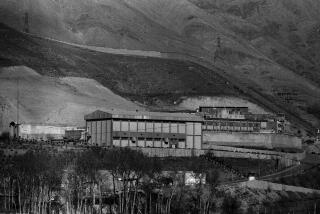Lack of Funds Hampers Release of Cuban Detainees
WASHINGTON — Insufficient funds and housing are hampering the release of Cubans who are being held by the federal government, a high-ranking Justice Department official said Thursday.
Deputy Atty. Gen. Arnold I. Burns told a congressional hearing that of 1,200 Cuban detainees approved for release since a review program started last June, only 282 have been freed because the government cannot find enough halfway houses or relatives to take them.
Many “have been held for some time after the decision for release was made,” he said. “We must do better; we will do better.” Later, another Justice Department official said the department may seek additional funds through a supplemental appropriation to expedite settlement of the Cubans.
More Riots Feared
The new sense of urgency for release of the 3,816 Cuban prisoners held in prisons around the country stems partly from concern that overcrowded prison conditions could lead to more riots like the ones that erupted last November in Oakdale, La., and Atlanta when the State Department announced an agreement with Cuba that called for returning 2,500 Cuban detainees to their homeland.
Following those disturbances, the 2,400 prisoners involved were dispersed to other facilities, thus adding to existing problems.
Burns called the situation “very unhealthy,” adding that the government must guard against “other powder-keg situations.”
Several advocates for the Cubans called it ironic that the riots spurred the government into trying to accelerate settlement of the Cubans, but at the same time made it more difficult to find Cuban-American families willing to take them.
“We’ve been pressing them to move these people for 2 1/2 years,” said Richard Ryscavage of the U.S. Catholic Conference, which helps settle the Cubans. “Now, since the riots, they’re in a hurry themselves.”
A ‘Natural Reaction’
At the Cuban American National Foundation, Mario Portuondo said the reluctance of families to take in the detainees is a “natural reaction” to publicity surrounding the riots and the crimes committed by the detainees.
A fourth of the rioting prisoners at the Atlanta federal penitentiary and the Oakdale facility were convicted of serious crimes, Burns said, ticking off the offenses: 81 murders, 16 kidnapings, 56 sex assaults, 299 robberies, 201 assaults, 12 arsons.
“The overwhelming number of these crimes were committed in these United States,” Burns said.
In his testimony before the House Judiciary subcommittee on courts, civil liberties and the administration of justice, Burns portrayed the government as facing a dilemma: how to expedite the releases and at the same time ensure that the Cubans pose no danger to U.S. communities.
However, in their testimony, critics of federal policy portrayed the government as having contributed to current problems by unfairly detaining many of the Cubans who were among the 125,000 entering the country in the 1980 boat lift from Mariel, Cuba.
Insufficient Proof
Marvin H. Shoob, a U.S. District judge in Atlanta, testified that he knows of “repeated instances where people were found at the (Atlanta) penitentiary who simply should not have been there” because there was insufficient proof they committed serious offenses.
He said the prison riots “should have been anticipated and could have been prevented.”
Shoob has repeatedly ruled that Cuban prisoners should be given individual hearings but his decisions were overturned on appeal.
In his testimony, he urged legislation that would allow detainees to be released after they were held for six months. “The burden should be on the government to establish that detention is proper,” he said.
But Justice Department officials defended as fair the government’s policy of screening detainees and insisted that finding a place to send them is the most pressing problem now.
Robert Martinez, director of the Community Relations Service, an arm of the Justice Department, said his agency has held numerous meetings with community leaders in Miami and Atlanta to seek homes and that 800 potential families have been identified.
More to Read
Sign up for Essential California
The most important California stories and recommendations in your inbox every morning.
You may occasionally receive promotional content from the Los Angeles Times.










